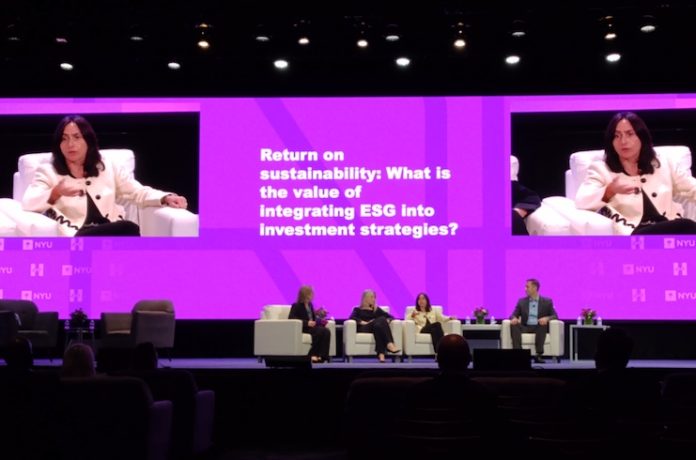
Among the many topical sessions at the 46th Annual NYU International Hospitality Industry Investment Conference was “Return on Sustainability: What Is the Value of Integrating ESG Into Investment Strategies?” Panelists Anne Becker-Olins, global head of design & technical services luxury, Accor; Benedetta Cassinelli, CEO, Considerate Group; and Paul Stanley, director, Corporate & Investment Banking ESG Solutions, Wells Fargo, raised several useful considerations for owners looking to invest in greening their properties, beginning with the importance of taking a long view on the initiative.
“Sustainability is not something you develop in six months or one year; it is a long-term journey,” said Becker-Olins. Cassinelli also emphasized that sustainability considerations impact the long-term strategy for hotel owners, including their approach to operations changes and property upgrades. “First you must demonstrate that you achieve operational efficiency and long-term savings,” she said, adding that creating “green teams” is helpful in this effort. Second, long-term savings can be demonstrated with CapEx investments into everything from more energy-efficient HVAC to double-glazing windows. “Most of the CapEx [projects] nowadays have access to tax incentives and subsidies, so it’s a really good time for asset owners to take into consideration these investments,” said Cassinelli.
Financing
Stanley highlighted various financing resources for owners in this area, including Sustainability Linked Loans (SLLs), which are based on targets in areas such as greenhouse gas emissions, green building certifications, energy intensity, etc. “The way SLLs work is each year if you achieve your annual target, you get a modest reduction in your pricing. If you don’t achieve that target, there’s a modest increase in your pricing, and this process repeats each year over the tenure of the loan,” Stanley explained. “We’ve seen some clients embrace this as a way of getting potential benefit for the good work they’re looking to do across their entire portfolio.” He also cited increased interest around C-PACE (Commercial Property Assessed Clean Energy) financing: “It’s essentially a way for borrowers to finance energy efficiency or renewable energy projects over a longer term, 20-30 years.”
Lastly, Stanley noted Wells Fargo’s new Green Label Commercial Real Estate Lending Program, which has three components: a term loan pillar that’s based on green building certification and EnergyStar certification; a renovation pillar with the potential for benefit based on energy efficiency compared to a baseline prerenovation audit, as well as a potential additional benefit if the owner/operator achieves water reduction based on the level of water scarcity in the property’s location; and a ground-up construction pillar that focuses on green building certification. “We’re hopeful [the new program] makes some sustainable projects happen,” he said.
Sustainability Metrics
Tracking progress in a sustainability initiative is based on the KPIs of the system used. “We see a lot of clients aiming to use SASB (Sustainable Accounting Standards Board) as a framework,” said Stanley. SASB’s 77 industry-specific standards focus on areas such as energy intensity, greenhouse gas emissions, water usage, climate resiliency, etc. “Biodiversity is an emerging area,” he added. “We’ve been having a lot of discussions with clients around where are their locations and where there could be potential biodiversity vulnerabilities in those areas.”
Cassinelli noted that “SASB comes very much from the real estate point of view,” and its metrics are “sometimes not enough for hospitality assets that are far more complex than standard real estate assets. So, we tend to add the sustainability framework that is really pertinent to our industry. … And when we talk about certification, we see two types: building certifications [e.g., LEED] that apply to real estate and hospitality certifications [e.g., GreenKey]. We see more and more that asset owners and managers tend to pick both.” Regarding the latter, Becker-Olins pointed out, “Hospitality certifications give you a very simplified, very clear framework that you can start working with and really understand [what aspects of sustainability are] pertinent to your brand and to your strategy, and then from there you can start developing a long-term strategy.”
In addition to the KPIs from the certification system, green building compliance for the local area should factor into that long-term strategy. “It’s really important that owner/operators understand how the math works in the jurisdictions where they’re operating—what types of fine exposure could they be looking at, so they can do the assessment of repairs they have coming up in short term,” said Stanley. Owner/operators may well want to “future proof these buildings and spend the money in the short term to make the buildings better as opposed to paying a fine in 2030,” for example.
The ROI Opportunity
Determining the right financing strategy and metrics for a sustainability initiative and then implementing the program takes a considerable amount of time and effort. But the motivation should be that “sustainability aligns with the commercial interests of your company in the long term,” Cassinelli suggested. “Another important consideration is that even if you are unsure about all the benefits [of enhancing sustainability], it is important that you start to add to the area in a slow way. You don’t need to be a leader in sustainability; you just need to be middle of the card. You don’t want to be left out.”











